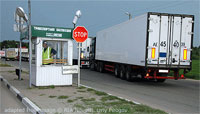Borderline Etiquette
A Historic Visa Agreement Gets Postponed Indefinitely as Russia Monitors U.S. Elections
and Prepares for a Return of the Putin Administration
Samuel Vary - Russia Profile - russiaprofile.org - 4.11.12 - JRL 2012-68
A groundbreaking visa agreement between the United States and Russia will likely be stuck for months in the Russian State Duma, where it awaits parliamentary ratification as required by Russian law. Despite the fact that the document was signed in November of 2011, a senior United Russia deputy claims that the visa question would not receive any attention in the coming year, and will be reviewed no earlier than the election of the new (or second-term) American president this November.

file photoIf and when Russia ratifies the agreement, it will grant American and Russian citizens an unprecedented level of access to their respective countries of destination, removing many of the stringent requirements now in place, such as the need to produce a letter of invitation. It would allow tourists and business applicants to receive a three-year, multiple-entry visa, thus saving frequent travelers the trouble of constant re-applications and considerably loosening up the overall process of obtaining the visa. Currently, U.S. visas are available to Russians for a term of up to two years, provided that applicants pass an interview with U.S. immigration officials. Russian visas for Americans are issued only for the indicated dates and duration of the traveler's stay.
The newly sworn-in U.S. Ambassador to Russia Michael McFaul has already drawn some attention to the agreement and the lack of progress made by the Duma during his first months in office. His remarks at a recent International Travel and Tourism Exhibition in Moscow indicate that the ratification of such a treaty would contribute to a greater level of openness with Russia. McFaul cited the rising number of exit visas issued to Russians as evidence, with 221,888 given out in 2011, the highest number in history, and 27 percent more than the U.S. Embassy issued in the previous year. Correspondingly, the rate of visa rejections has remained relatively low, hovering around ten percent for the past two years.
However, McFaul now finds himself immersed in a host of other issues, and both sides have made it clear that in terms of top diplomatic priorities for the remainder of 2012 and beyond, which include anti-ballistic missile defense systems in Europe and the heated debate over Syrian human rights violations, a contract dealing with travel documents may disappear altogether, depending on whether it retains value as a bargaining chip for Russia. Russian Foreign Minister Sergei Lavrov delivered optimistic remarks in January that reflected McFaul's sentiment, stating: "the visa deal significantly boosts our relationship, and I think it will become a step toward a visa-free regime with the United States." As of now these words ring hollow, given the evident lack of United Russia's desire to expedite the parliamentary process in such an eventful and complicated year of politicking.
"This particular visa agreement will represent both substantive as well as, perhaps equally importantly, symbolic